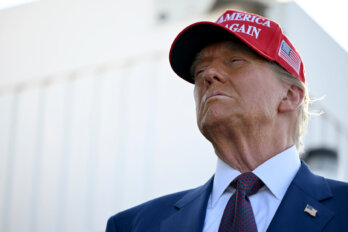Once they leave office, modern American ex-presidents get libraries and museums in their honour; pensions and Secret Service protection; financial reimbursements for everything from office space to personal staff; and, in some cases, intelligence briefings from their successors’ administrations. These and other perks are an extension of a broader commitment American political culture has toward presidential deference—a long-held tradition that is worth questioning, especially now.
While there are many examples of presidential legislative power, including the ability to veto Congress, issue executive orders and pardons, or withhold information from Congress, deference is a subtler thing, rooted in ritual and ceremony. It’s the respect, esteem, and ingratiation granted to the office of the presidency and, by extension, to the men who have occupied it. As The Nation columnist Jeet Heer pointed out to me, it’s why presidents receive military salutes and issue honours. It’s the pomp and grandeur of the State of the Union address, to which the president arrives by motorcade before the sergeant-at-arms announces his arrival to Congress. It is, in other words, comparable to many tributes other countries, Canada among them, reserve for monarchs and their representatives. And, for many presidents, it lasts well beyond their terms in office: some enjoy deference for life.
Although Donald Trump liked to claim that no president had ever been treated worse than him, he, too, enjoyed presidential deference throughout his four years in office. Despite Trump referring to the press as the enemy of the people, commenting on where former Fox News host Megyn Kelly did or did not bleed from, and banning CNN’s Jim Acosta from the White House after calling him a “rude, terrible person,” for much of Trump’s presidency, many journalists tried to treat him as they would any other president, such as by providing platforms for his side of political arguments even when that side advanced disinformation and hate speech.
As legendary CNN anchor and correspondent Christiane Amanpour predicted in 2016, journalism faced an “existential crisis” during the Trump era. Caught off guard, the press seemed to take a few years to find a way to fact-check Trump’s comments in real time and cover his presidency without helping spread his lies. Meanwhile, in the final months and weeks of his administration, and particularly in the fallout from the January 6 attack on the US Capitol, social and mainstream media started to do what many had hoped for: deplatform the president. This included major networks cutting away from Trump’s press conferences and Twitter and Facebook kicking the president off of their sites, though whether Trump will be banned from Facebook permanently is under review by the company’s oversight board. These weren’t insignificant steps, but after more than four years and with just weeks left of Trump’s administration, some pundits proclaimed they were “too little, too late.”
It’s tempting to think that the problem of how to deal with a president as unorthodox as Donald Trump has been solved now that he no longer holds office. But, as an ex-president, Trump joins an elite club of living former presidents: Jimmy Carter, Bill Clinton, George W. Bush, and Barack Obama. And, unless the US breaks with political norms, Trump will continue to receive at least some of the deferential treatment granted to former presidents, all in the name of respecting the office he held, upholding tradition, and even, some may argue, helping to unite a deeply divided country. The question is whether a man who spent years flouting political norms ought to be worthy of this one.
After the American Revolution, the political system that emerged in the wake of George Washington’s presidency planted the roots of much of what the US must work with today. For many Americans, Washington set an example of how to be both a virtuous president and a virtuous American, and his presidency set a precedent that the head of state ought to be a role model, someone to look up to. Without a monarchy, the union of diverse states needed something to hold its federal system together. If it wasn’t going to be a monarch (as in Canada), America’s founders decided it would be the Constitution and the man elected to uphold and protect it. “When the American system works—which isn’t always—the president is a unifying figure in the same way a monarchy is supposed to be: someone who embodies the nation as whole, not just the party they belong to,” Jeet Heer told me.
Listen to an audio version of this story
For more audio from The Walrus, subscribe to AMI-audio podcasts on iTunes.
This unifying role would, in some cases, extend beyond the presidency. Upon Washington’s death, in December 1799, two years after he left office, eulogists thanked providence for bestowing Washington on “mankind, to instruct them both how to live and how to die,” and for opening “to our children a volume so pure and instructive, as THE LIFE OF WASHINGTON!” Nearly fifty years later, construction started on the Washington Monument, which would become a symbol of the national capital. According to Lindsay Chervinsky, a presidential historian and the author of The Cabinet: George Washington and the Creation of an American Institution, not all former presidents received such tributes. In the country’s early years, Americans tended to elevate only those who left an extraordinary legacy of public service: Washington for having fought the British, Thomas Jefferson for having written the Declaration of Independence. No one gave Washington’s successor, John Adams, the same postpresidency treatment, and several nineteenth-century presidents—Benjamin Harrison, Grover Cleveland, and Chester Arthur among them—occupied a quieter life after they left office.
The Former Presidents Act, passed in 1958, during Dwight D. Eisenhower’s presidency, marks the emergence of a more robust support system for ex-presidents. Although Harry S. Truman, who had left office five years prior, was financially comfortable, both he and former president Herbert Hoover supported the act, which gives ex-presidents a pension as well as financial reimbursement for office space and staff. Legislators created the act in part to “maintain the dignity” of the presidency and to preserve the welfare and well-being of ex-presidents. Sam Rushay, supervisory archivist at the Harry S. Truman Presidential Library and Museum, says Truman accepted his pension, though he opposed any notion that one may profit from the “prestige and dignity of the office of the presidency” and made it a policy not to accept any speaking fees unless they went toward his presidential library and museum. (Hoover, who in his prepresidential life had been a wealthy businessman, donated his pension to charity.) It’s worth remembering that these were the days before former presidents racked up speaking fees in the hundreds of thousands of dollars.
To Chervinsky, the kind of deference afforded to past presidents today—“the presidents’ club, Secret Service protection, treating them very much with kid gloves”—is likely linked with the rise of mass media in the twentieth century, which could track former presidents’ movements more easily, as well as with the fact that most former presidents now live longer. (By the same token, Chervinsky notes, some benefits, such as Secret Service protection, are often warranted.) The Secret Service assumed full responsibility for the presidents’ protection in the early twentieth century, but its surveillance of the president, his family, and the White House grew significantly during the Second World War. In 1965, Congress granted former presidents Secret Service protection for life, though these benefits were scaled back in 1994 as a cost-cutting measure. “I think we have seen that being a former president can be a pretty lucrative career,” one representative said in support of the cuts. But, in 2013, the Obama administration reinstated lifetime protection for ex-presidents and their spouses, a perk that’s believed to cost taxpayers tens of millions of dollars a year, per president.
It’s hard to find a president who is comparable to Trump, though Richard Nixon may come close. So, when thinking about how Trump will be treated postpresidency, I was curious about the only president who has ever resigned from office. In his postpresidential life, Nixon quickly found himself pardoned by president Gerald Ford, in 1974, before charges had even been brought against him. Speaking on The Mehdi Hasan Show last November, Kevin Kruse, a historian at Princeton University and co-author of Fault Lines: A History of the United States since 1974, said that Nixon’s pardon “didn’t heal the nation, it only aggravated the sense that Nixon had escaped justice.” Kruse added that the pardon “emboldened Nixon,” and he pointed to the former president’s famous 1977 interview with British broadcaster David Frost, in which Nixon famously declared, “Well, when the president does it, that means that it is not illegal.”
Despite resigning from the job over the Watergate scandal, Nixon maintained some perks of postpresidential life in addition to his pardon. In 1990, his presidential library and museum opened in Yorba Linda, California, Nixon’s birthplace, with a ceremony featuring then president George H. W. Bush and former presidents Ronald Reagan and Gerald Ford. Chervinsky stresses that, among politicians in particular, there was “internal deference” when it came to Nixon. “Even though Nixon was sort of persona non grata publicly, he helped a lot of presidents after he left office, especially on foreign policy. They would call him and ask for his advice.” Indeed, it was then president Bill Clinton who helped to rehabilitate Nixon’s posthumous public image. The two became unlikely friends, and Clinton delivered the eulogy at Nixon’s 1994 funeral, which could have been a state one had his family not opted for a smaller service at the Nixon library. Perhaps fortuitously for a president who would later be impeached, Clinton called for “the day of judging President Nixon on anything less than his entire life and career” to “come to a close.”
A rare refusal, then and now, to entertain the notion that even dead presidents deserve deference came from gonzo journalist Hunter S. Thompson. In his obituary to Nixon, published in Rolling Stone, Thompson wrote, among many other things: “If the right people had been in charge of Nixon’s funeral, his casket would have been launched into one of those open-sewage canals that empty into the ocean just south of Los Angeles.” Too much? Thompson didn’t think so. “Some people will say that words like scum and rotten are wrong for Objective Journalism—which is true, but they miss the point. It was the built-in blind spots of the Objective rules and dogma that allowed Nixon to slither into the White House in the first place.” Nixon, he closed, “has poisoned our water forever.”
Keep in mind what Nixon had been accused of: covering up a break-in at the Democratic National Committee’s headquarters. Keep in mind what Trump has been accused of: colluding with a foreign power to interfere in American elections and inciting an insurrection against the US Capitol. Maybe, in an era of fake news and disinformation, one in which presidential deference persists, the only kind of journalism capable of capturing the spirit of the Trump administration will have to be gonzo in nature. “You had to get Subjective to see Nixon clearly,” Thompson noted. The same may prove true for any future Trumpian candidates.
Although Trump will go down in history as the first president to be impeached twice, his acquittal in the Senate, fuelled by Republicans’ willingness to maintain a public allegiance to him, means that the prospect of holding Trump accountable will fall to other branches of government. There are still, for instance, ongoing investigations in Georgia, for Trump’s efforts to overturn the state’s election results, and New York, for his family business’s dealings. But, unless reforms are put in place, Congress’s willingness to overlook Trump’s many infractions will no doubt help to, as Chervinsky put it, pave the way for abuse of power by “frankly smarter actors.” Meanwhile, speaking on the The Mehdi Hasan Show, Kruse suggested that the refusal to apply the law to the president “only encourages lawlessness by future chief executives and the people who work for them.”
The fact of the matter is that Trump shows no signs of retiring into a quiet postpresidential life. Not when some 74 million Americans voted for him and, according to a poll last December, 62 percent of Republicans say it’s “very likely” that the Democrats stole the election. Financially speaking, Trump doesn’t need the perks afforded to former presidents (neither do any living ex-presidents, for that matter), and he will manage to wreak havoc on the country with or without them. But denying Trump the reverence and respect bestowed on former presidents—the invitations to ceremonies, for instance, or a pension worth more than three times the average American household income—may be the only recourse Americans have for holding Trump accountable and for sending an important message about what they will and will not tolerate from their leaders, past, present, and future.
Biden has already started to do this, saying in early February that Trump should not receive the customary intelligence briefings granted to former presidents, though that decision ultimately rests with his national security team. But, as we enter these post-Trump years, I’m reminded of an analogy American writer George Saunders made in an April 2020 story for The New Yorker, called “Love Letter.” In the story, a grandfather is writing a letter to his grandson in the near future, a future when Trump has maintained his iron-clad grip on the country and his son has won a “sham election,” though the Trumps are never named. “If you’ll allow me a crude metaphor . . . ” the grandfather writes. “A guy comes into a dinner party, takes a dump on the rug in the living room. The guests get all excited, yell in protest. He takes a second dump. The guests feel, Well, yelling didn’t help. (While some of them applaud his audacity.) He takes a third dump, on the table, and still no one throws him out. At that point, the sky has become the limit in terms of future dumps.”
The question many Americans—not to mention foreign dignitaries, members of the press, and social media CEOs—have to ask themselves is this: Once you’ve managed to actually throw this guy out and have started to clean up his mess, do you still invite him to your garden party several months later? Doing so sets a new precedent for what you’re willing to tolerate. Not doing so risks pissing off the people who managed to actually like the guy. Neither option is good: both are dangerous, but one is disastrous.





